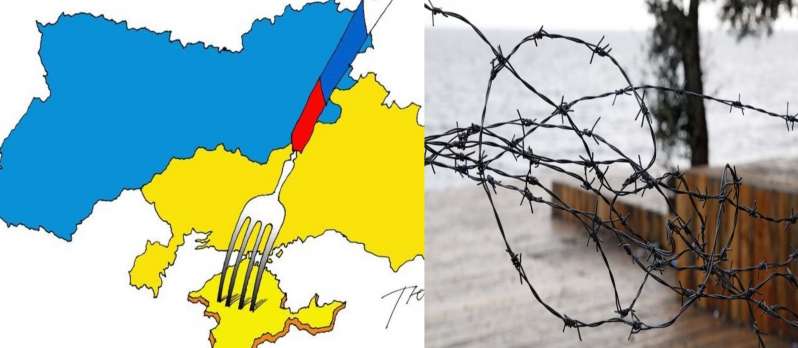Russian ‘pride’ over invasion and annexation of Crimea is fading fast

A survey by the authoritative Levada Centre has demonstrated a significant decline in the number of Russians declaring what the pollsters call the ‘reunification of Crimea’ to be a matter of pride for them. Since the reasons are doubtless economic, Ukraine’s former Foreign Minister Pavlo Klimkin is not alone in believing it is time for an information campaign spelling out, especially to young Russians, the direct link between Russia’s invasion and ongoing occupation of Crimea and the country’s economic woes.
The survey, with one unfortunate addition (about Crimea), has been repeated many times since 1999 and, in general, makes for fairly depressing reading. The only “event or phenomenon in the history of our country” that Russians now feel more pride over than in 1999 is the Soviet victory in what is termed the Great Patriotic War from 1941-1945 (from 86% in 1999 to 89% in September 2020). The so-called ‘reunification of Crimea’ has been given as a possible ‘source of pride’ three times: in January 2017; December 2018 and September 2020, with this coming in third place from the point of view of how often it was mentioned. That has, however, dropped, from 43% in 2017; 45% in 2018 to only 30% in September 2020. Lev Gudkov, the Levada Centre’s Director, notes that, although there was a reduction with respect to virtually all of the options, except WWII, it was only over Crimea that a sharp fall was seen.
Gudkov explained to Krym.Realii that after the annexation of Crimea, they “noticed a powerful nationalistic euphoria, an increased sense of pride, a feeling of strength and of Russia’s revival; a sharp increase and militaristic and imperialist sentiments.” The latter, he says, fell noticeably after the government significantly raised the pension age for both men and women in 2019. While the average in 2020 was 30%, the figure among young people was much lower – 21%; unlike 37% for the older part of society.
“That is, this triumph over the seizure of another country’s territory is going from the more active and educated groups to the social periphery, to the poor and those who are dependent on the authorities. That is the most important change that we are observing. I think that the collective resource of euphoria and excitement over Crimea has ended.”
Gudkov names several reasons, all linked with economic difficulties, which have now been exacerbated by the pandemic which, he says, has led to around a quarter of the people having lost their jobs. He believes that people are beginning to reassess the country’s foreign and domestic policy and to understand that there is a direct cause and effect relation between Russia’s actions, including the annexation of Crimea and involvement on the side of dictator Bashar al-Assad, in Syria, and the fall in the standard of living.
It is noticeable that in the interview, Gudkov does not mince words, correctly speaking of annexation and seizure of another country’s territory, yet in the survey people are asked about ‘reunification’. Using the correct terminology could get the Levada Centre into trouble in modern Russia, but it much surely influence the likely answers. People may well feel discomfort at expressing pride at their country having seized another country’s territory / annexed Crimea / being an occupying state. It sounds much nicer to call it ‘reunification’, yet it is the other terms that are correct and the reason that sanctions remain in place.
Russian political analyst, Dmitry Oreshkin notes that at the beginning of the 1990s, Russians were mostly concerned about shortages, financial concerns, but that, having become disillusioned with the market economy, they looked for something to cling to. They have increasingly turned to the past – to the Second World War and to the supposedly ‘great and mighty’ Soviet Union, with the empty shelves and huge queues conveniently forgotten, unlike the repeated mantra about the USSR having occupied a sixth of the earth’s territory. All of this, Oreshkin sees as “a direct road to Crimea”, to triumphing over Crimea being “ours”. He speaks of a childish pleasure that Russian President Vladimir Putin essentially gave the finger to international law and the world swallowed it, but warns that this pleasure has largely faded.
Although some people in occupied Crimea are likely to have been interviewed for the survey, this was a survey about Russians’ attitudes. With freedom of speech having been crushed in occupied Crimea and international monitors prevented from carrying out proper fact-finding missions, there are no surveys to indicate how Crimeans now view what happened in 2014 and its consequences. Even those who are not suffering political persecution are likely to be disgruntled at very least by economic hardships and by the mounting crisis over water. Russian lawyer Nikolai Polozov said back in 2018 that even those in occupied Crimea who had earlier supported annexation were now disillusioned. The promised prosperity had not eventuated, he explained, adding that you can’t even come out onto the streets to protest anymore.
Former Ukrainian Foreign Minister Pavlo Klimkin pointed to the fall in ‘pride’ over Russia’s occupation of Crimea as an opportunity that Ukraine should make use of. He says that it is particularly worth concentrating on young people who “in Russia are increasingly rejecting the Kremlin’s imperialist aggressive policy. “ Russia is currently trying to push the idea that the mounting problem over the lack of water in Crimea is a humanitarian crisis which is caused by Ukraine. The question must arise, Klimkin asks, why Russia is only now setting aside resources in response to the problem. The Kremlin clearly thought that Ukraine could be coerced into reinstating water supplies and is now realizing that is not the case. It is seeking to put the blame on Ukraine which is another area where the latter needs to be proactive now, especially on social media in making it quite clear who bears direct responsibility for increasing problems in occupied Crimea.





